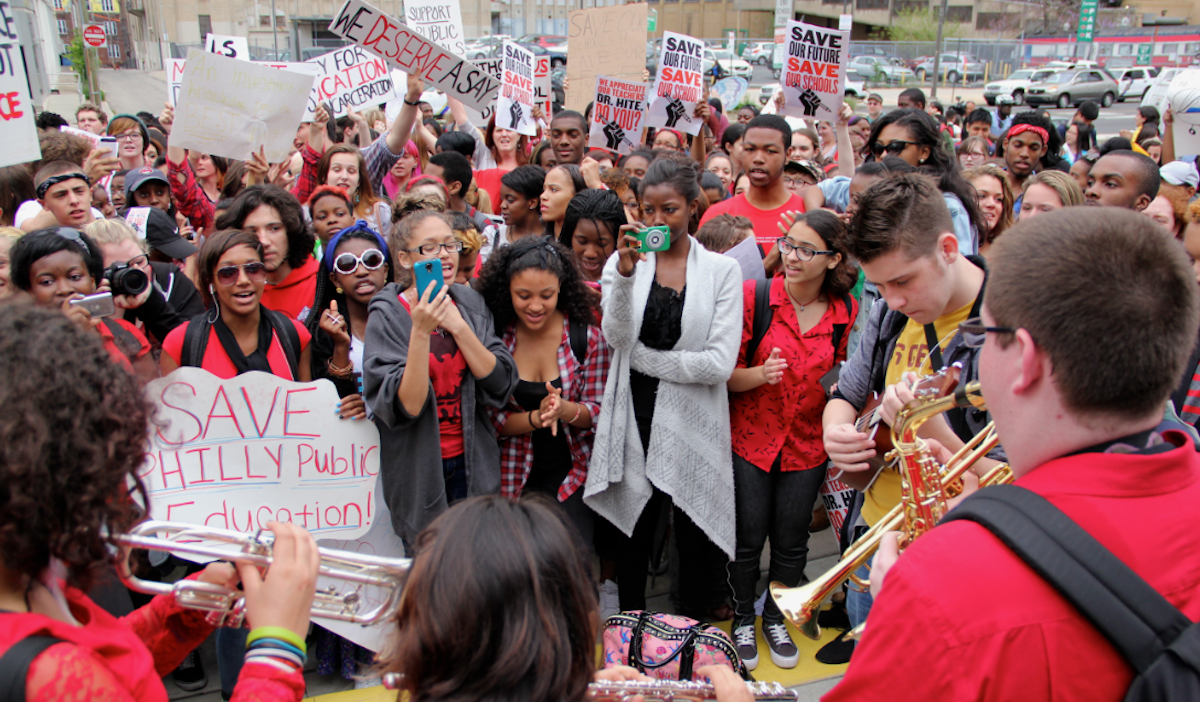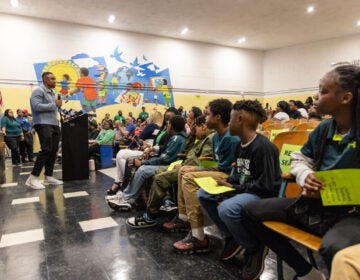Many in Philly protest as Pa. House acts on school funding

Students from the Philadelphia High School for the Creative and Performing Arts protesting budget cuts in May. (Emma Lee/for NewsWorks, file)
The Pennsylvania House passed key pieces of Gov. Tom Corbett’s Philadelphia schools funding package Monday night.
While many education advocates and Democratic state lawmakers said the deal was woefully inadequate, Philadelphia Superintendent William Hite and School Reform Commission chairman Pedro Ramos issued a statement Monday supporting the plan’s passage.
The Republican-controlled House approved legislation that gives the school district a one-time infusion of $45 million in state funds, which were previously owed to the federal government, but now have apparently been forgiven.
The House also signed off on letting Philly extend a 1 percent sales tax that was scheduled to expire in 2014, and assumes that the district will be able to borrow $50 million this school year against that planned funding boost. State officials said the tax could raise up to $120 million annually for the schools in future years.
The legislation approved by the House has been inserted into a group of overall budget-related bills that were amended, so they now head to the Senate again for approval. The GOP-led Senate has already approved the Philadelphia funding proposal, though, so that part of the legislation appears to be a done deal.
Corbett signed a budget late Sunday night that also provides an additional $2 million in basic education funding for Philadelphia’s schools, on top of the extra $16 million in his February spending plan. His package counts on the city raising $30 million for schools by improving local tax collections.
All together, that’s about $127 million in additional revenue from the city and state that the school district was not relying on — which is $53 million less than what district officials said they desperately needed in order to avoid thousands of layoffs and program cuts. It is unclear how much of that pain will be averted under Corbett’s deal.
The district is also asking for $133 million in labor concessions, mostly from the teachers’ union, whose contract expires Aug. 31.
Grover Norquist and the cigarette tax
Early Monday, Philadelphia City Council President Darrell Clarke said another proposal, which would allow the city to enact a cigarette tax in order to raise school funding, was not dead. But the House ultimately didn’t consider it Monday night.
State Rep. Cherelle Parker (D-Philadelphia) blamed the death of the cigarette tax legislation on Grover Norquist, founder of Americans for Tax Reform and father of the no-new-taxes pledge that many Republican legislators have signed. Others who were close to the negotiations said that the proposal’s fate was not helped by the fact that the Philadelphia delegation was not united behind it.
Sen. Anthony Hardy Williams (D-Philadelphia), who sponsored the state-enabling legislation for the cigarette tax, said he would bring it up again in the fall.
A portion of the extra funding for Philly’s schools comes with strings attached. The money is contingent on the Pennsylvania education secretary deciding that the district has enacted “reforms that provide for fiscal stability, educational improvement and operational control.”
Though some Philadelphia House Democrats were concerned Sunday that the language was anti-labor, teachers’ union president Jerry Jordan ultimately decided that he was not against it.
“It does not affect bargaining,” he said, referring to this summer’s contract negotiations.
“Band-aid on a gunshot wound”
Parker called the state’s funding for Philly schools a “band-aid on a gunshot wound.” She said that Corbett’s plan generated $50 million of debt for a school district that already has a heavy debt load.
State Rep. Curtis Thomas (D-Philadelphia) said the plan was “speculative” and “tantamount to voodoo.”
State Rep. William Adolph (R-Delaware) responded directly to Thomas’ remarks: “I don’t like the word ‘voodoo.'” Adolph said the state’s funding package was a real attempt to help the school district.
David Cohen, Comcast’s executive vice president who worked as chief-of-staff to Ed Rendell when he was Philadelphia’s mayor, also argued that Corbett did the right thing.
“He has exercised leadership,” said Cohen. “He has stepped up in the 30 times this has almost come off the track.”
Cohen, a Corbett fundraiser, was a key part of the negotiations. The Greater Philadelphia Chamber of Commerce, too, worked behind the scenes to secure $45 million in one-time state dollars. The business group also backed the cigarette tax that looks to be dead for now, while opposing a Council proposal that would have boosted schools funding through an increased levy on commercial property owners.
Throughout the last few days, lawmakers from across Pennsylvania argued on the House and Senate floors that the state’s education funding is not determined by a fair, predictable formula, but by political clout and the luck of the draw.
Education advocates agree. The nonprofit Public Citizens for Children and Youth, which sees Corbett’s Philadelphia schools package as seriously lacking in state funds, said in a Monday email to its supporters that this budget season proved the need for a formula.
“This approach is a recipe for disaster for communities where the poverty rates are growing and the tax base is shrinking,” the email read. “As a result, Philadelphians must link arms with suburban and rural communities and demand a predictable and adequate funding formula for public education.”
WHYY is your source for fact-based, in-depth journalism and information. As a nonprofit organization, we rely on financial support from readers like you. Please give today.




